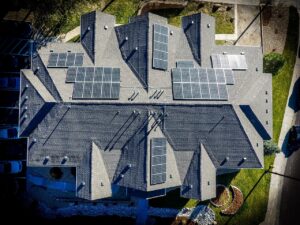Introduction
Welcome to the world of the solar battery, where renewable energy meets innovative storage solutions. As we face the pressing challenges of climate change, the need for sustainable energy sources has become more critical than ever. With its abundance and environmental friendliness, solar power has emerged as a leading contender in the race for a greener future.
In this article, we will delve into this fascinating world, exploring how they work, their benefits, and how to choose the right one for your needs. We will also touch upon the installation process, maintenance tips, and a glimpse into the future. So, grab a cup of coffee (or tea, if you prefer) and prepare to embark on a journey toward energy independence and environmental stewardship.
Why A Solar Battery?
Solar batteries offer a multitude of benefits beyond traditional solar power systems. Let’s explore some compelling reasons why this investment is a wise choice:
Energy Independence
Firstly, you can achieve a level of energy independence that was once unimaginable. By storing excess solar energy during the day, you can use it at night or during power outages. This means less reliance on the grid and more control over your energy supply.
Backup Power during Outages
One of the significant advantages is their ability to provide backup power during grid outages. When the grid goes down, your system can keep critical appliances running, ensuring comfort, safety, and peace of mind.
Optimized Energy Consumption
Solar batteries allow you to optimize your energy consumption. You can charge your battery during times when electricity rates are lower, such as during off-peak hours, and use that stored energy during peak demand periods. This helps to reduce electricity costs and maximize your savings.
Time-of-Use Optimization
Many utility companies have adopted time-of-use (TOU) billing, where electricity rates vary based on the time of day. A battery allows you to strategically draw power from the battery during peak rate hours, saving you money on your electricity bills.
Reduced Reliance on the Grid
They reduce your dependence on the grid, minimizing the impact of fluctuating electricity prices and reducing your vulnerability to utility rate hikes. This empowers you to take charge of your energy consumption and costs.
Reduced Carbon Footprint
Solar batteries enable you to store and utilize the clean, renewable energy your solar panels generate. By reducing reliance on fossil fuels and decreasing carbon emissions, you contribute to a cleaner environment and help combat climate change.
Energy Security
Regardless of external factors, they give you a reliable and secure power source. Natural disasters, grid failures, or unforeseen events can disrupt the power supply, but a solar battery provides a backup solution, ensuring you have electricity when you need it most.
Long-term Cost Savings
While the upfront cost of a solar battery system may seem significant, it offers long-term cost savings. By maximizing the self-consumption of solar energy and minimizing grid dependence, you can significantly reduce your electricity bills over time, making it a financially sound investment.
Increased Property Value
Installing a solar battery can increase the value of your property. Homebuyers are increasingly attracted to homes equipped with solar panels and storage systems due to the potential for energy savings and environmental benefits. It can be a selling point and provide a competitive edge in the real estate market.
Environmental Stewardship
By investing in a solar battery, you actively participate in the transition to clean, renewable energy. By reducing reliance on fossil fuels and embracing sustainable practices, you become an environmental steward, contributing to a greener future for generations to come.
With these compelling reasons, it’s clear that a solar battery is not just an accessory to a solar power system but a game-changer in the pursuit of energy independence, cost savings, and environmental sustainability.
How Solar Batteries Work
The Science Behind it
Solar batteries harness the sun’s power and convert it into usable electrical energy. When sunlight falls on the solar panels, the panels absorb the photons and generate a flow of electrons, creating direct current (DC) electricity. However, most homes and appliances use alternating current (AC) electricity. This is where solar batteries come into play.
The DC electricity produced by the solar panels is sent to an inverter, which converts it into AC electricity. The AC electricity can then be used to power your home or stored in a solar battery for later use.
Types of Solar Batteries
There are several types of solar batteries available, each with its own advantages and characteristics:
- Lithium-ion Batteries: Lithium-ion batteries are becoming increasingly popular for solar energy storage. They offer high energy density, longer lifespan, and deep cycling capabilities. These batteries are lightweight, compact, and require little maintenance.
- Lead-acid Batteries: Lead-acid batteries have been used for solar energy storage for many years. They are cost-effective but have a shorter lifespan compared to lithium-ion batteries. They are available in two types: flooded lead-acid (FLA) batteries and sealed lead-acid (SLA) batteries.
- Flow Batteries: Flow batteries are a relatively newer technology in solar energy storage. They store energy in a liquid electrolyte and offer the advantage of easy scalability. Flow batteries have a long cycle life and can be charged and discharged simultaneously.
Each type of solar battery has its own cost, capacity, efficiency, and lifespan considerations. It’s important to evaluate your needs and consult a professional to determine the most suitable option for your solar energy storage system.
Choosing the Right Solar Battery
Considerations
Selecting the right solar battery for your needs requires careful consideration of several factors:
- Energy Storage Capacity: Determine how much energy you need to store based on your average daily energy consumption and any backup power requirements. Consider the size and capacity of the battery to ensure it can meet your energy storage needs.
- Depth of Discharge (DoD): The depth of discharge refers to the amount of battery capacity that can be used before recharging. Some batteries can be discharged deeper than others without impacting their lifespan. Consider your usage patterns and choose a battery with an appropriate depth of discharge.
- Cycle Life: The cycle life indicates the number of charge and discharge cycles a battery can withstand before its capacity degrades significantly. Opt for a battery with a higher cycle life to ensure longer-lasting performance.
- Efficiency: Consider the battery’s efficiency, both in terms of charging and discharging. Higher efficiency means more energy stored and less energy lost during the charging and discharging process.
- Warranty and Support: Look for solar batteries that come with reliable warranties and adequate customer support. This ensures peace of mind and assistance in case of any issues or concerns.
Cost vs. Benefits
While cost is an important consideration, weighing it against the benefits and long-term savings offered by the solar battery is crucial. A higher upfront cost for a more efficient and durable battery can result in significant savings over its lifespan, reducing energy bills and avoiding utility costs during blackouts.
By carefully evaluating these considerations, you can choose the solar battery that best suits your energy storage requirements, budget, and long-term goals.
Maintaining Your Solar Battery
Proper maintenance of your solar battery is essential to ensure its optimal performance and longevity. Here are some key aspects to consider when maintaining your solar battery:
Regular Checks
Regularly monitor the state of your solar battery to ensure it’s operating efficiently. Check the battery charge level using the built-in indicators or monitoring system provided with your battery. This will give you an idea of how much stored energy is available for use.
Cleaning the Terminals
Over time, the battery terminals may accumulate dirt, dust, or corrosion. It’s important to clean the terminals periodically to maintain good electrical conductivity. Use a soft cloth or brush and a mixture of water and baking soda to clean the terminals gently. Be cautious and follow safety guidelines when handling and cleaning the battery.
Checking for Damage
Inspect your solar battery for any signs of physical damage, leaks, or bulging. Damage to the battery casing or terminals should be addressed promptly to avoid potential hazards and ensure the integrity of the battery. If you notice any significant damage, it’s advisable to consult a professional for assistance.
Maintaining Proper Ventilation
Ensure that your solar battery is installed in a well-ventilated area. Excessive heat can shorten the battery’s lifespan and affect its performance. If necessary, use ventilation fans or other cooling mechanisms to maintain a suitable temperature range for the battery.
Periodic Equalization
Some types of solar batteries, such as lead-acid batteries, benefit from periodic equalization. Equalization involves intentionally overcharging the battery for a short period to balance the cell voltages and prevent sulfation. Check the manufacturer’s guidelines or consult a professional to determine if equalization is recommended for your specific battery type.
Following Manufacturer’s Recommendations
Always refer to the manufacturer’s instructions and guidelines for maintenance procedures for your solar battery model. Each battery type may have unique requirements, such as specific charging voltages, maintenance schedules, or recommended practices. Adhering to these recommendations will help optimize the performance and lifespan of your solar battery.
The Future of Solar Batteries
The future of solar batteries holds exciting possibilities for technological advancements and integration into our energy systems. Here are some potential developments to look forward to:
Enhanced Efficiency
Researchers and engineers are constantly striving to improve the efficiency of solar batteries. Advancements in materials and design are expected to lead to higher conversion efficiencies, allowing for increased energy storage and utilization from solar power systems.
Increased Energy Density
The energy density of solar batteries refers to the amount of energy they can store per unit of volume or weight. Future innovations may lead to batteries with higher energy densities, enabling more compact and lightweight solar energy storage solutions.
Longer Lifespan
Efforts are being made to develop solar batteries with longer lifespans. Through improved materials, manufacturing processes, and a better understanding of battery chemistry, future batteries may offer extended cycle life, reducing the need for frequent replacements and improving overall cost-effectiveness.
Integration with Smart Grids
Integrating solar batteries with smart grids is an ongoing research and development area. This integration allows for better management of energy flow, optimized charging and discharging, and improved grid stability. It can also enable the participation of solar battery owners in demand response programs, providing benefits to both the grid and the battery users.
Emerging Technologies
In addition to the current types of solar batteries, such as lithium-ion and lead-acid, new technologies are being explored. These include solid-state batteries, flow batteries, and advanced capacitor-based systems. These emerging technologies have the potential to offer higher energy densities, faster-charging rates, improved safety, and longer lifespans.
As the renewable energy landscape evolves, solar batteries will continue to play a vital role in our transition toward a sustainable future. The ongoing research and development efforts aim to make solar batteries more efficient, durable, and cost-effective, enabling widespread adoption and integration into our energy systems.
Conclusion
In conclusion, solar batteries are not just a means to store excess solar energy; they represent a pivotal step towards a sustainable, energy-independent future. By harnessing the sun’s power, we can reduce our reliance on fossil fuels, lower our carbon footprint, and contribute to a cleaner and healthier planet for future generations.
It’s an investment in your own energy independence and a statement of commitment to a greener tomorrow. With the ability to store and utilize solar energy, you can enjoy an uninterrupted power supply, even during blackouts or when the sun breaks behind the clouds.
As we continue to witness technological advancements, the future holds even greater promise. With enhanced efficiency, increased energy density, and longer lifespans, they will play a vital role in reshaping our energy landscape. Integration with smart grids and the exploration of emerging technologies further exemplify the exciting possibilities that lie ahead.
So, take the leap, join the renewable energy revolution, and become a part of the solution to combat climate change. Together, we can harness the sun’s power and create a sustainable, brighter future for future generations.
FAQs
What is the lifespan of a solar battery?
Typically, solar batteries last between 5 and 15 years, but with regular maintenance, they can potentially last longer.
Do they work during a blackout?
Yes, they do. Solar batteries can provide power during a blackout, making them a great emergency power source.
Can I install a solar battery myself?
It’s highly recommended to have a professional for installation due to the system’s complexities and to ensure safety.
How much does a solar battery cost?
The cost of solar batteries varies greatly depending on the type, capacity, and brand. It’s best to do your research and find one that fits your needs and budget.
Are solar batteries environmentally friendly?
Absolutely! Solar batteries, combined with solar panels, reduce CO2 emissions and reliance on fossil fuels, making them a sustainable choice for power generation.





Pingback: Solar Panel Kits: Embrace the Convenience of Solar Power
Pingback: Solar Powered Generator: The Future of Sustainable Energy
Pingback: Facts About Solar Energy: Harnessing the Sun's Power
Pingback: Portable Solar Panels: An Anywhere, Anytime Solution
Pingback: Sustainable Architecture: A Guide to the Future of Design
Pingback: Flexible Solar Panels: Eco Friendliness With a Bend & a Twist!
Pingback: Self Sustaining Homes: A Definitive Guide to the Exciting Future
Pingback: What Is Sustainability? Unlocking the Power to Transform Our World
Pingback: Solar 5e: Harnessing the Sun's Energy Like Never Before
Pingback: Facts About Recycling: Conserving Resources & Building Sustainability
Pingback: Recycled Shoes: A Step Towards a Sustainable Future
Pingback: How Do Solar Panels Work: A Guide for Curious Minds
Pingback: Navigating the World of Sustainable Clothing Brands
Pingback: Sustainable Shoe Brands: A Step Towards a Greener Future
Pingback: Pros and Cons of Solar Energy: Weighing it Up - Eco Life Wise
Pingback: Solar Farms: Harnessing the Power of the Sun - Eco Life Wise
Pingback: Three Pillars of Sustainability: A Guide to a Better Future
Pingback: Sustainable Jewelry: The Future of Ethical Fashion - Eco Life Wise
Pingback: Eco Friendly Companies: Meet the Eco Super Heroes
Pingback: Most Efficient Solar Panels: A Comprehensive Guide
Pingback: Off Grid Air Conditioner: A Green Solution to Beat the Heat
Pingback: Off Grid Trailers: The Ultimate Guide - Eco Life Wise
Pingback: Off Grid Wind Turbine: Harness the Power of Wind - Eco Life Wise
Pingback: Sustainable Agriculture: A Green Revolution | Eco Life Wise
Pingback: What is Biodiversity and Why Should We Care? | Eco Life Wise
Pingback: How to Live Off the Grid: Your Ultimate Guide
Pingback: Composting Toilets: From Waste to Wonder and Fertilizer Gold!
Pingback: Off Grid Solar System: A Step Toward Self Sufficiency
Pingback: Eco Friendly Cars: The Journey Toward Sustainable Driving
Pingback: The Solar Shower: Making a Splash the Eco Way | Eco Life Wise
Pingback: The Solar Water Fountain: Top 5 Picks For Your Outdoor Space
Pingback: Sustainable Gifts: An Eco-Friendly Choice | Eco Life Wise
Pingback: Benefits of Renewable Energy: The Future is Bright (and Windy!) | Eco Life Wise
Pingback: Sustainable Fish: Safeguarding Our Oceans' Future | Eco Life Wise
Pingback: Sustainable Fashion Brands: Redesigning Style Responsibly
Pingback: Eco Friendly Phone Cases: Smart For a Sustainable Lifestyle
Pingback: Advantages of Renewable Energy: Embracing a Cleaner Future | Eco Life Wise
Pingback: Charge Your Electric Car With Solar Panels: The Ultimate Guide to Green Energy! | Eco Life Wise
Pingback: What Are The Pros And Cons Of Nuclear Energy? 10 Points to Spotlight | Eco Life Wise
Pingback: Net-Zero Revolution: How North Carolina is Chasing Carbon Neutrality | Eco Life Wise
Pingback: Why Is Organic Farming Considered More Sustainable? | Eco Life Wise
Pingback: Solar Energy Pros and Cons: 8 Considerations | Eco Life Wise
Pingback: How Can I Make My Home More Energy Efficient? 10 Simple Steps | Eco Life Wise
Pingback: Commercial Solar Panels: Exploring the Lifespan | Eco Life Wise
Pingback: Deforestation and Climate Change: 7 Remarkably Simple Links
Pingback: Sustainable Development: 10 Bold Approaches | Eco Life Wise
Pingback: What Is A Green Building? | Eco Life Wise
Pingback: Safely Recycling Lithium Batteries: 13 Things You Should Know | Eco Life Wise
Pingback: Solar Development on Brownfields and Landfills: 8 Factors That Unlock Value | Eco Life Wise
Pingback: Renewable Energy Sources: 10 Ways They Help Reduce Greenhouse Emissions | Eco Life Wise
Pingback: Why Is Sustainable Agriculture Important: 10 Vital Reasons | Eco Life Wise
Pingback: What Are The Best Ways To Conserve Energy At Home? | Eco Life Wise
Pingback: Sustainable Living: 8 Practical Benefits of the Sustainable Lifestyle | Eco Life Wise
Pingback: How Does Self-Sustaining Architecture Differ From Traditional Architecture? 7 Big Ways | Eco Life Wise
Pingback: Why Should We Reduce Single-Use Plastics? 6 Compelling Reasons | Eco Life Wise
Pingback: How Do Self-Sustaining Buildings Manage Energy Consumption? 5 Innovative Ways | Eco Life Wise
Pingback: How Do Wind Turbines Generate Electricity? 4 Ways That May Surprise You | Eco Life Wise
Pingback: How Can I Encourage My Community To Be More Eco-friendly? | Eco Life Wise
Pingback: Examples of Natural Resources: Unearthing Earth's Treasures | Eco Life Wise
Pingback: Energy Efficient Homes: Your Ultimate Guide to Greener Living | Eco Life Wise
Pingback: Why Is Conserving Energy Important For The Future? | Eco Life Wise
Pingback: How Do Off-Grid Communities Source Water And Power? | Eco Life Wise
Pingback: What Role Do Materials Play In Self-sustaining Architecture? | Eco Life Wise
Pingback: What Is Sustainable Development? 8 Possible Answers | Eco Life Wise
Pingback: What Is The Role Of Energy Storage In Renewable Energy Systems? | Eco Life Wise
Pingback: Allto Solar Remote Meter Review: 10 Amazing Facts | Eco Life Wise
Pingback: Vegan Fitness: 10 Handy Tips | Eco Life Wise
Pingback: Victron Energy SmartSolar MPPT Tr 250V 60 Amp Solar Charge Controller Review | Eco Life Wise
Pingback: Victron Energy BlueSolar Charge Controller Review | Eco Life Wise
Pingback: Solar Energy Hope for the Future VHS Review | Eco Life Wise